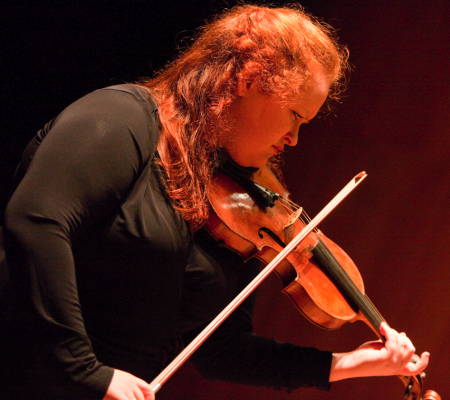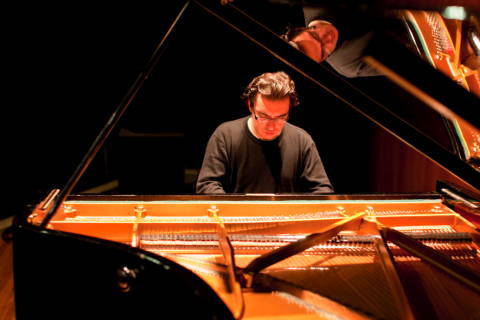|

Discoveries Ahead
MALCOLM MILLER samples
'The World of Jewish Music'
Passion and colourful intensity in works by Ernest Bloch, by the Terezin composer Gidon Klein, and in a UK première by Israeli composer Tzvi Avni, were qualities displayed by the prize winners of three international competitions at their impressive and enjoyable afternoon Purcell Room recital in London on Sunday 29 November 2009. The outstanding talents of Roisin Walters, violin, Matej Arendarik, piano and the London Myriad Ensemble regaled a large and enthusiastic audience at the first events of The World of Jewish Music, presented by the Jewish Music Institute, SOAS, at the South Bank, which also featured a Yiddish film with live music and a Purcell Room Klezmer concert as climax.

Roisin Walters. Photo © 2009 Nigel Bewley
|
Roisin Walters, currently at the Royal Academy of Music, studying with the distinguished virtuoso Hu Kun, displayed passion and ravishing tonal qualities in her rendition of Bloch's Nigun, the work which won her the prize of the International Ernest Bloch Society awarded at the 2009 Ernest Bloch Competition, organised by The Spiro Ark last July. Her rounded musicality was shown in a delightfully alert and delicate Mozart Sonata in G, K301, responsively supported by pianist Timothy End, and a compelling account of Sarasate's Ziegeunerweisen, her balance of spine-tingling eloquence in the slow opening with fizzing fireworks eliciting spontaneous audience cheers.
More highlights followed in two stirring piano sonatas by Gideon Klein and Janácek purposefully interpreted by the young Slovakian pianist Matej Arendarik, winner of the JMI/EPTA Prize for Terezin composers, a new initiative in the European Union Piano Competition held in Prague, where Arendarik also won overall second prize.
Gideon Klein was one of the youngest and most gifted Terezin composers, who, like Ullmann and Krasa and Haas, defiantly sustained artistic creativity in captivity from 1941 until his tragic deportation to Auschwitz in 1944. Arendarik's lucid textures and variegated touch highlight the Sonata's intense motivic logic, Bergian chromatic harmony and expressive fluctuations with a structural maturity. He brought clarity to the dense ostinato type textures and drew on appealing colours even in the fast dissonant outbursts. The slow movement was especially mesmeric, its dreamy variant of the main motif imbued with a more elegiac quality; the finale's upbeat character, its syncopated energy and lightness of texture belied the external conditions in which it was conceived.

Matej Arendarik. Photo © 2009 Nigel Bewley
|
Arendarik's pianistic promise came across too in his involving and beautifully shaded account of Janacek's Sonata 1 X 1905, a programmatic work memorialising a victim of Czech politics in its elegiac slow movement, where meditative halos of sound are dreamily projected interrupted by a central impassioned outpouring, the highly charged rhetorical mood receding to the calm ending spiced with unexpected modulations. As throughout, Arendarik projected nuances of harmony and texture with captivating finesse.
The well-contrasted programme concluded with works for wind quintet by the London Myriad Ensemble, winners of the Second International Israeli Music Competition organised by The Spiro Ark last July. Here they performed a characterful UK première of the five-movement Woodwind Quintet (1959), a charming youthful work by one of Israel's leading senior composers, Tzvi Avni (born 1927). Its early Eastern Mediterranean style radiates a Malcolm Arnold-like neo-classicism though spiced with Jewish and middle eastern modality, melismatic ornamentation and dance rhythms, all of which the ensemble conveyed with aplomb.
The first movement displays a type of ritornello form in which soloistic interludes alternate with airy syncopated tutti textures. The second movement, a set of variations on a beguiling modal theme, colourfully shifts between contrasting timbral groupings, shifting from clarinet, to a bassoon and flute duet, then horn with bassoon, and in variation three, an oboe solo accompanied by the rest of the ensemble; the clarinet's return in the fourth variations signals a conclusion for the full ensemble. Perhaps the expressive heart was the fourth movement's 'Dialogo Elegaico', in which mellow interactions evolved in the flowing and at times dissonant counterpoint between horn and clarinet, while the fugal finale transparent counterpoint came alive in the well pointed chirpy syncopations. The bassoon's initial subject was keenly imitated by the clarinet, oboe, flute and horn in turn, while the rhythmic texture sustained attention through its melismatic ornamentation and unexpected silences. Though clearly an early work, its energy and focused use of dissonance and interaction in the ensemble represented a fascinating glimpse into the background to Avni's later modernist complexity, as expressed in the atonal and serial music of the 1970s, as well as his more recent inspiration in Jewish, Israeli and middle-eastern dance styles.

The London Myriad Ensemble. Photo © 2009 Ed Hurst
|
Samuel Barber's Summer Music Op 31 (1956) offered a sumptuously impressionistic mood to conclude, affirming the London Myriad Ensemble's fine blending and coordinated teamwork.
The concert as a whole, which also featured a classic Russian silent film with a newly composed score infused with klezmer by Robin Harris, and a klezmer concert by Sophie Solomon and her band, marked twenty-five years of Jewish Music concerts at the South Bank presented by the JMI and its former incarnations as Jewish Music Heritage and the B'nai Brith Jewish Music Festival. It is an achievement which has stimulated increased appreciation and popularisation of the multi-facetted field of Jewish music and culture in the wider community. With its many related academic and creative projects, the JMI has made a significant impact on the British musical life and one looks forward to the next quarter century of exciting Jewish Music and new discoveries ahead.
Copyright © 3 December 2009
Malcolm Miller,
London UK

|

